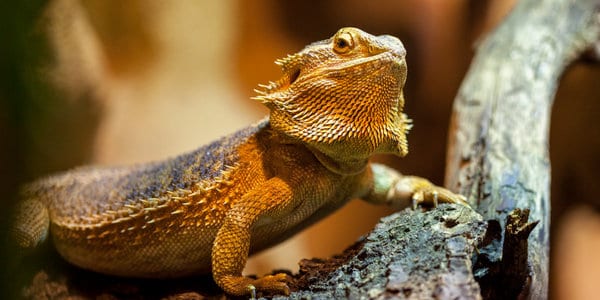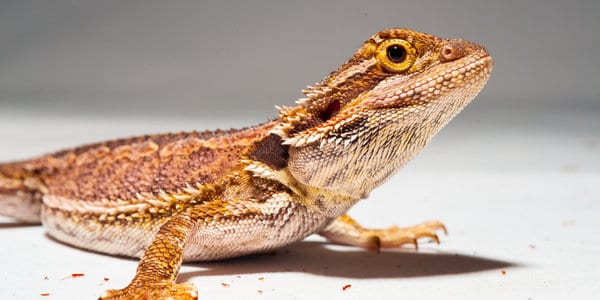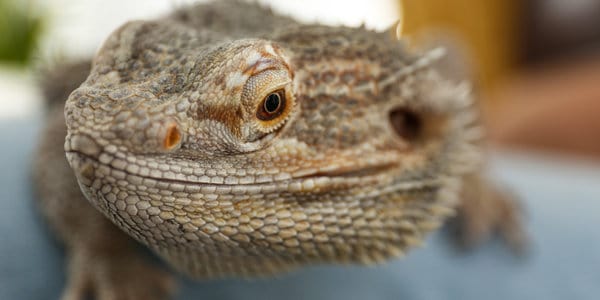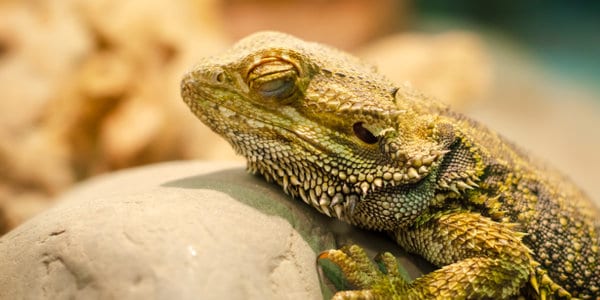
Bearded dragons are hardy, easy, and simple to care for. However, they are susceptible to illnesses such as those affecting the eyes.
Bearded dragon sunken eye problem is one of the eyes challenges quite common in these reptiles. It can create worry for new bearded dragon owner.
In this guide we will discuss the common causes of sunken eyes in bearded dragons, effective solutions, and other common eye problems and their causes.
6 Causes Of Sunken Eyes In Bearded Dragon
Sunken eyes are pretty easy to see in bearded dragons, indicating a health problem. However, the underlying cause might not be outright. If your bearded dragon has sunken eyes, here are some of the most probable reasons.
1. Dehydration
One of the most common reasons for sunken eyes in bearded dragons is dehydration. It often occurs when your beardie does not drink enough water or get enough from the food. Worth noting is that these reptiles can also get sick from drinking too much water.
Most bearded dragon owners prefer to give these lizards drinking water from a bowl in captivity. However, bearded dragons prefer drinking flowing water instead of still. Either way, ensure that your pet is well hydrated.
Besides sunken eyes, other indicators of dehydration in a bearded dragon include lethargy, lack of appetite, droopy eyes, or wrinkly skin.
2. Poor Habitat Setup
The habitat you choose to give your beardie will be its home. It ultimately affects the pet’s quality of life and even health. Some of the things to consider in setting up an ideal habitat for a bearded dragon include the size of the habitat, the material of habitat, and supplies UVB light, flooring, and basking rock.
One of the vital things to remember when choosing the setup and supplies is that these reptiles are adapted to semi-desert habitats. The habitat you choose needs to mimic this environment. At the least, your pet should get sufficient light and temperature.
Sadly, most bearded dragons’ natural habitat have the wrong setup. The temperature is often not ideal, and the light source might not be appropriate.
Some pet owners do not provide the reptiles with a UVB light source which is very important. Besides this basking light, owners are supposed to provide the beardie with a cold side to cool down after basking.
The appropriate temperature depends on the pet’s age. Baby bearded dragons are more suited if the basking warmth is between 95 and 100 degrees Fahrenheit. The cooler spot should be between 80 and 90 degrees Fahrenheit.
On the other hand, mature bearded dragons do not need a basking area with high temperatures like those of babies. It should be between 90 and 93 degrees Fahrenheit, while the colder area should be between 80 and 90 degrees.
Excess heat, beyond these recommendations, can make your beardies eyes appear sunken. It is primarily because this exposure to high temperatures dehydrates the reptile besides other effects, and this dehydration results in sunken eyes.
Other signs of extreme temperature in your pet’s habitat include red skin coloration on the throat and face, lethargy, excess restlessness, heavy panting, and difficulty in breathing.
3. Illnesses
Another possible reason why your bearded dragon could be having sunken eyes is underlying health problems. Some of the common illnesses in bearded dragons whose signs include sunken eyes are;
· Metabolic Bone Disease
It is a very common illness in these lizards, often resulting from Calcium and/or Vitamin D3 deficit. If your beardies diet is low in calcium, it is at a high risk of this illness. In addition, a diet that is high in oxalates or phosphorus puts your pet at risk of calcium deficit. The two bind calcium, therefore, hindering its absorption into the bearded dragon’s body stream.
READ MORE: How Often Should You GIVE Your Bearded Dragon CALCIUM?
· Eye Infection
Eye infection in the lizard can make its eyes sunken. It could be a result of viral or bacterial infections. The eyes might also be affected by parasites. Besides appearing sunken, other signs of eye infection in bearded dragons include discharge and swelling.
4. Weight Loss
Weight loss in the reptile indicates that there is a problem. Besides affecting the eyes, it can affect the animal’s appetite and general behavior. Common causes of weight loss in beardies include starvation, poor feeding, and illness.
In cases of extreme weight loss, the bearded dragon might lose a lot of muscle mass making the eyes get sunken. Other weight loss signs in beardies include lethargy, visible ribcage, and reduced-fat pads.
5. Parasitic Infections
Parasitic infections can make your dragon really uncomfortable. They disturb their eyes or even bite, making their eyes sunken. Other signs that might manifest with internal parasites infections include loss of appetite and weight loss.
Some of the most common parasitic infections in bearded dragons are tapeworms and roundworms. The latter affects the intestines, while the former affects other body parts.
Others are external, which are the most harmful because they can make the eyes get sunken. In addition, they can make the bearded dragon very uncomfortable.
External parasites affecting bearded dragons include small ticks, fleas, and mites. Your dragon might get them from the environment or contact with other animals with the parasitic infection.
6. Low Humidity
Reptiles rely on high humidity for survival. A lack of this might make the dragon have sunken eyes plus other dehydration signs.
The lizard’s skin will fold and scale because of the low moisture levels in the low-humidity environment, and one visible effect of this is the eyes of the reptile sinking.

Remedies For Sunken Eyes In Bearded Dragons
Sunken eyes indicate that something is not okay with your bearded dragon. Therefore, you need to take drastic measures to prevent the situation from getting worse and reduce the chances of death.
Vision is also vital in most animals. Thus, you should take seriously any sign of a problem with this sense.
Here are effective solutions to fix sunken eyes in bearded dragons that you should consider.
1. Water
If you suspect that your bearded dragon has sunken eyes because of dehydration, then you should provide water. The water should be clean and easily accessible to encourage the reptile to hydrate.
Hydration helps maintain proper eye shape and is also vital in other body functions such as digestion.
Get a bowl and place it at a convenient part of the reptile’s habitat. Another way of hydrating a bearded dragon is by misting its habitat and the animal’s skin.
Where possible, provide moving water because these lizards prefer it to still water.
Bathing the dragon also helps to keep them hydrated. When cleaning, its skin gets nourished, and the reptile will also drink water.
2. Include Enough Greens In The Diet
Another way of hydrating is by including safe foods with high water content in the bearded dragon’s diet. Most vegetables have high amounts of water, with some of the safe ones for bearded dragons being broccoli, cilantro, and mustard greens.
Your pet will get hydrated while still getting nutrients from these vegetables. Including vegetables in each meal is important irrespective of the lizard’s age.
If you don’t have the above vegetables but have access to cacti, it is also a good source of hydration for a bearded dragon.
Keeping your pet hydrated will help get rid of sunken eyes if dehydration is the underlying cause.
3. Provide Ideal Temperature and Humidity
Baby and mature bearded dragons have different suitable temperatures for basking and the cooler side of their enclosure.
As for the babies, the basking temperature should range between 95 and 100 degrees Fahrenheit, while the cooler one should be at around 5-15 degrees Fahrenheit colder. As for adults, the basking warmth should be 90 – 93 degrees Fahrenheit, while the colder side one should be about 3 – 10 degrees cooler.
Humidity should remain between 20 – 40 % to make the enclosure conducive to the pet. During extreme heat, place the beardie beneath a tap running with cool water for almost a minute to increase humidity levels.
After this, treat their environment by increasing ventilation, mist the enclosure, and maintaining temperatures between 75 and 85 degrees Fahrenheit.
If you are busy, you can get a reptile fogger to do the misting job for you. The accessory has a digital timer to set the frequency of sprays or the number of preferred misting times.
Another effective tip for maintaining ideal correct humidity in the enclosure is misting leaves and branches.
Providing ideal heat and correct temperature in a bearded dragon’s habitat helps preserve the moisture, thus reducing the chances of dehydration.
4. Treat the Disease
If your bearded dragon has suitable habitat and is well hydrated, the reason for sunken eyes might be an underlying illness.
It is best to consult a professional help such as a vet before to help detect the disease and identify an effective treatment method.
Self-diagnosis at home might lead to the reptile’s death as you lack the expertise and might give the animal the wrong treatment.
5. Check For Parasites
Ticks and mites often infest the eyes and ears. If you have ruled out the other reasons and your pet still has sunken eyes, check for small black and red spots in these areas. If only one eye is affected, the beardie will tend to close it and leave the other open. Take your bearded dragon to the vet for treatment if you notice parasitic infections.
Depending on the nature of the parasitic infection, the vet might recommend deworming drugs that may either be injectable or oral.
In case of ticks or mites, they might also recommend topical, injectable, or oral medication. It would also be ideal that you clean the environment, disinfect it and treat it to prevent post-treatment parasitic infections.
6. Include More Fats In The Diet
Sunken eyes are not appealing to look at; neither is a skinny bearded dragon. If you have ruled out the other reasons for sunken eyes and your pet shows other signs of severe weight loss, you should consider fattening it up.
Provide the reptile with a proper diet that, besides greens, also includes waxworms, super worms, and hornworms that are an ideal source of fats for the bearded dragon.
You should also provide it with enough food to ensure that it is not starving. However, be careful as bearded dragons may get addicted to high-fat foods or treats and refuse to eat other less attractive and less tasty foods.
If the bearded dragon refuses to eat, consult a vet to ensure that it doesn’t die from starving.
These remedies will often work in correcting sunken eyes in your bearded dragon. It is essential to also talk to the vet while implementing these remedies to ascertain that you are doing the right thing.
Preventive measures such as giving the pet an ideal habitat and frequently treating it for parasitic infestations will go a long way in preventing the problem from recurring.

Other Bearded Dragon Eye Problems
Besides sunken eyes, bearded dragons are susceptible to other eye problems such as bulging, swollen, and droopy eyes.
They, too, can be very uncomfortable for the pet and might indicate an underlying illness or something wrong with the lizard’s habitat.
Let us have an in-depth look at each of these other bearded dragon eye problems, their common causes, and how to avoid and correct the same.
Bulging Eyes
A bearded dragon’s eyes might bulge for several reasons. It is a common thing with most beardies that looks very uncomfortable.
They do this naturally, and in most cases, it is harmless. It often lasts for a short while, and the eyes will resume the normal shape quickly; you might not even notice it.
However, it might be a concern in some cases and an indicator of a severe health problem.
Below are a few of the pretty common reasons the reptile might bulge its eyes out. We also get to discuss the effective solutions to employ.
1. Shedding
The reptiles shed differently depending on their age. The younger shed more frequently with this process occurring every few weeks, while those between 6 and 12 months shed every few months. Those aged above one and a half years, often considered mature, shed on rare occasions.
When shedding their skin, these lizards bulge their eyes to loosen the surrounding skin and make the process easier. The eyes will appear swollen or seem to have grown bigger. They may also seem to pop out of its head.
It is vital to observe and understand your pet’s shedding pattern and how you can assist the pet with the process. One of the most effective ways of doing this is by ensuring that you maintain their enclosure clean and provide ideal humidity levels of between 30% and 40% all the time.
Such humidity levels stimulate its natural environment and allow your bearded dragon to shed the skin faster while remaining healthy. Wrong tank setup can cause beardie’s eyes issue.
Wipe the eyes gently in case of skin buildup and gently pat the areas with warm cotton. If the bulging continues afterward for several days and the bearded dragon is no longer shedding, take it to a vet for examination.
Read More: How Often Do Bearded Dragons SHED? (Full Guide!)
2. High Blood Pressure
Even though it is normal for bearded dragons to bulge their eyes, especially when shedding, it might be of concern during other occasions. One of the dangerous causes of bulging eyes in these lizards is high blood pressure.
Bearded dragons and some of the other lizards often increase their blood pressure as a self-defense mechanism, but if there is no threat and this persists for more than an hour, you need to take it to a vet for immediate examination.
3. Itchy Eyes
The other explanation behind bulging eyes in lizards is itching eyes. They might increase blood levels in the area around the eyes to satisfy the itchiness.
There is no clear method of verifying this, and the safest solution is to take your pet to the vet for examination.
Droopy Eyes
Some bearded dragons naturally have droopy eyes. If your pet’s eyes are drooping, ensure that you first rule out genetic causes.
Here are some reasons why the reptile might be exhibiting this symptom.
1. Kidney disease
A combination of drooping eyes and a black beard are signs that your pet might be severely ill. Beardies might suffer from kidney problems because of a poor diet, low humidity, dehydration, and excess protein intake.
Irrespective of age, these factors put the lizard at risk of kidney problems that might be acute or chronic.
Other early signs of kidney problems in these reptiles include poor appetite and lethargy.
Since kidney problems are hard to detect early in these reptiles, it is best to take them to a vet for examination, especially if you observe a combination of these symptoms.
2. Dehydration
Dehydration is another common cause of droopy eyes. To examine the lizard for dehydration, gently pinch loose skin using the thumb and index fingers. The skin will slowly return to normal if the animal is dehydrated. It often results from lack of drinking water, illness, and diarrhea.
Provision of clean, accessible water is vital for the animal besides giving it rich in water foods. Warm baths also help keep the pet hydrated.
Other indicators of dehydration in beardies include poor appetite, lethargy, wrinkled skin, and lack of energy.
3. Infection
As discussed earlier, infections can cause various eye problems in bearded dragons, including drooping. Common eye infection causes in these reptiles include bacterial or fungal infection, a substrate with sand or fine particles that irritate the bearded dragon’s eyes, and Vitamin A deficiency.
Once again, the best way to rule out an infection and treat it is by taking the lizard to a vet.
4. Hypovitaminosis A
This disorder refers to Vitamin A toxicity. It results in droopy eyes as a result of swelling of the eyelids. It is a severe condition that, if not detected early, can cause severe damage to your pet’s eyes.
Besides the eyes, the disorder also affects the throat and can potentially make your pet’s entire body swell.
Swollen Eyes
A swollen eye is a rampant problem with bearded dragons. It arises from various reasons, including infections, tumors, weak blood vessels, and blockage in the tear ducts. Let us look at some of these reasons for swollen eyes in bearded dragons.
1. Shedding
Besides bulging eyes, shedding might also make the bearded dragon’s eyes get swollen. It is not abnormal and will go away with the shedding.
The best way to help your pet is by patting the swollen areas with warm cotton pads. Be careful to avoid injuring or infecting the eyes.
READ MORE: Bearded Dragon Stuck Shed: Everything You Need To Know
2. Infection
Another reason why the lizards’ eyes might appear swollen is an eye infection that might be fungal or bacterial. An open wound or scratch in its cornea exposes the eye to conditions that might make the eyes swell.
In addition, eye infection might be due to ticks or mites infestation.
Inspect the eyes for any signs of trauma and seek a professional’s guide on treatment. The expert might recommend antibiotics after examining the pet.
Ensure to follow the administration instructions and give the pet the full dose even if the swelling reduces before the recommended dosage is over.
3. Tumors
Any sign of growth near the bearded dragon’s eyes might indicate the presence of a tumor. In such a case, it will make the eyes swell, and you would need to urgently take the pet for examination to curb the tumor growth and damage.
Do not panic; a growth doesn’t necessarily need to be cancerous, but quick action will help rule out the chances of cancer.
In some cases, the growth might result from unsuccessful skin shedding. In such a case, you only need to repeatedly give the pet warm baths and place warm cotton over the swollen part; it will disappear with time.
4. Injury
Another common cause of swollen eyes is injury. Common causes of eye injuries in bearded dragons include a poor choice of substrate, dust, sand, leftovers in the enclosure, and damage from a sharp object.
If you suspect your pet’s eyes have dust or other irritants, use reptile eye drops to clear the eyes, and the swelling should disappear.
It is also vital to remove leftovers shortly after feeding the animal. Another preventive measure is choosing substrates with no sharp pieces or edges.
5. Vitamin A Toxicity
Also known as hypervitaminosis, this occurs when the bearded dragon has too much vitamin A in its body. Although Vitamin A plays a significant role in enhancing the lizard’s immunity and boosting organ health, including eyes, it can be toxic when it accumulates in high amounts.
The best solution for this is to avoid any supplements with Vitamin A. Else; it will be fine as the one it gets from most of the foods in its diet that are hardly in high amounts.
It is also good to take note of foods that are high in Vitamin A and limit the frequency at which you give them to the pet.

In case of severe infections where drug administration is one of the treatment methods, the eye will certainly take a long time to recover.
Frequently Asked Questions
Having seen the most common eye problems in these reptiles, let us now address some of the common questions about bearded dragon’s eyes.
Why Is My Bearded Dragon Closing One Eye?
It is definitely a matter to worry about if your beardie closes one eye and leaves the other open. It is certainly an indicator that something is amiss.
Some of the most common reasons for bearded dragons closing one eye include parasitic infections, illnesses, or the presence of a foreign object in the particular eye. Closely examine the eye that the lizard is closing for any visible cause. If unable to identify the reason, contact your vet.
How Fast Will My Bearded Dragon Recover From An Eye Problem?
There is no one-off solution to the treatment of eye problems. It all boils down to the specific issue and its extent. As such, there is no one fixed time as to which the eye will take to recover. For instance, in the case of a foreign object that has not caused any other harm, removing the item will cause instant recovery.
In case of severe infections where drug administration is one of the treatment methods, the eye will certainly take a long time to recover.
Conclusion
Beardies are known to be hardy pets, but they are susceptible to various illnesses. Bearded dragon sunken eyes can cause severe worry for their owners. While some of the causes are easy and quick to rectify, e.g., dehydration, others such as illnesses may take a little longer time.
The most effective solution to bearded dragon sunken eyes is hydrating them and taking them to a vet for further examination. Home treatment is not always ideal; it might cost the reptile its vision or even life. It would be best if you were on the lookout for other common bearded dragon eye problems, including droopy eyes, bulging eyes, and swollen eyes.
READ NEXT:
